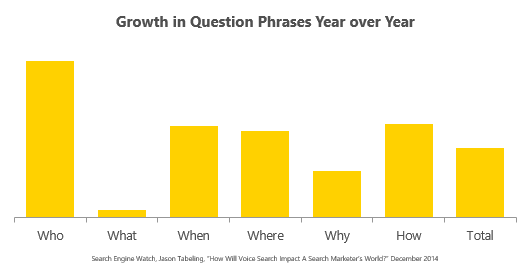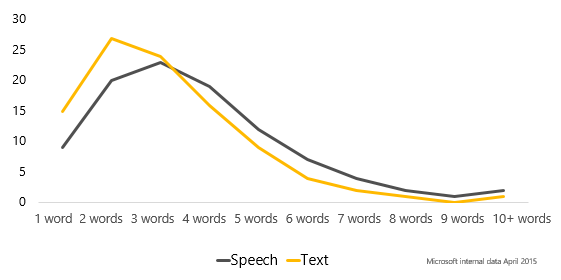Do you remember when Siri was new? Talking to your phone – and getting a response from it – was mind-blowing! Digital personal assistants are easing into our lives in the form of Cortana on Windows Phone and Google Now on Android, along with Siri on the iPhone. These personal assistants are there to answer our questions and help us, which is why they’re powered by search engines. Bing powers Cortana and Web search on Siri – Google powers Google Now.
As search marketers, voice search seems like an out-of-reach novelty. But there are a lot of clues use of voice search and personal assistants leave behind, even if we’re unable to target them directly.
The question is how is this speech input affecting (or not affecting) how our customers interact with search? And what can we do to adapt to it?
Today we’re looking at two critical aspects of voice-activated search:
- How is voice search different from text search?
- How should we adjust our search campaigns to capture voice searchers?
Voice Search Is Growing – Kind of by Default
Voice search is poised to grow, not just because of the growth of mobile, but Microsoft recently announced that Cortana will be on the desktop of Windows 10. Think about that for a moment. Starting later this year, hundreds of millions of PCs will have a voice-activated way to find whatever’s needed on the computer or the Web. Add Google Now and Siri to the mix and voice search is set to grow quickly.

Two Actionable Differences Between Voice and Text Search
We don’t have targeting for “text” vs. “voice” input yet. So what’s a marketer to do? There are differences we can keep an eye on and act on now:
1. Understand Voice Search Uses Question Phrases
Next time you use Siri, Cortana, or Google Now – think about how your interaction is different. With text-based search, you’d type in something like “Home Depot” and you’d click on the address to find its location. With voice search, you’ll say, “Where is the nearest Home Depot?”
Think about how you began your search. Did you open the search box by touch or prompt the assistant by saying “OK, Google.”
Not long ago an agency, Rosetta, published a brilliant article that shared the unique idea that voice search is marked by the use of question words: Who, what, where, why, and how.

These question phrases may give us vital clues that text-based searches don’t have.
The purchase funnel isn’t a perfect mental model, but it’s useful for visualizing the search process. How are question phrases like “who is” different from “where is”? Using the funnel we can align the question words with degree of intent like so:

There will be variation with your set of keywords, so keep that in mind. “What price” is likely to have much stronger intent than a general “what is” search.
Putting This Into Action
Use question phrases in your keywords, and negative the ones that don’t make sense for your product/offering. Pulling a search term report is a great place to start.
2. Know Voice Searches Typically Have More Words Per Search
Bing research shows that with text input, two-word queries are the most common, with a quick decline in use after three words in the query. With voice input, the most common query length is three and four words, with a more gradual decline in query length from there.

Putting This Into Action
Analyze your longer tail keywords to find patterns, some that stretch into six and seven words in length. Include the question phrases. Add positives or negatives accordingly.
What Do You See for Voice Search in the Future?
As using your voice grows as a search medium, more options may rise for targeting and delivering better experiences. But until then, there are clues we can use to be smarter about our marketing.
Are you banking on text-based searching or leaning into voice search? We’d love to hear your predictions on voice search and its impact on PPC.



